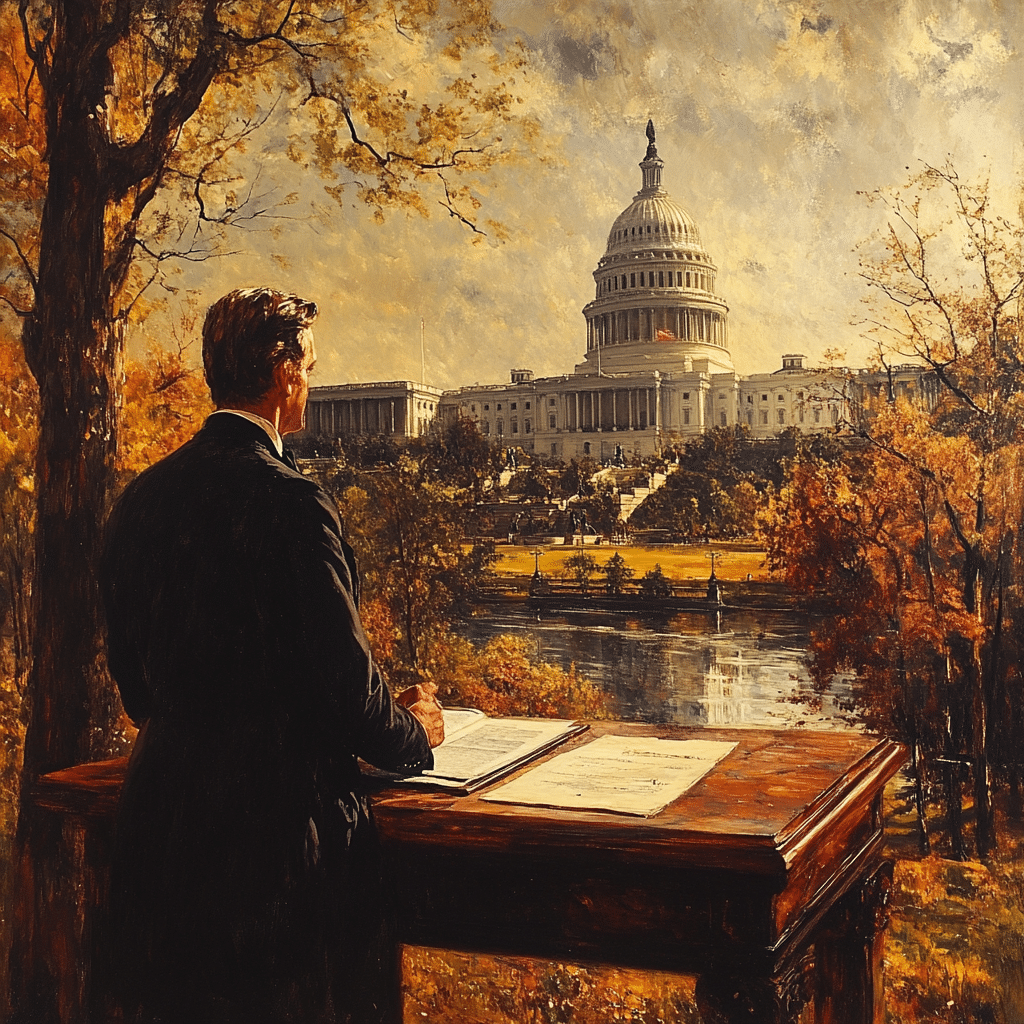The Role of Constitutional Amendments in American Society
The United States Constitution stands tall as a living document, having undergone 27 amendments since it was orchestrated in 1787. These constitutional amendments have been crucial in carving out the rights and freedoms we hold dear. They don’t just enhance our democracy; they address some of the most pressing issues that face citizens today, standing as a testament to American resilience and values. With the current climate stirring debates about labor unions, societal roles, and foreign policy, it’s important to reflect on the amendments that have sculpted the landscape of American rights.
Speaking of resilience, these amendments have been instrumental in driving social change, often pushing back against trends that threaten our core values, like the so-called ‘Woke’ movement. Whether it’s amplifying First Amendment rights or engaging in discussions about the Second Amendment, these amendments provoke fundamental questions about our liberties. As the conservative voice continues rising, our understanding of these amendments becomes clearer, empowering us to challenge the status quo.
Additionally, as the nation gears up for the upcoming elections and confronts contemporary issues like anti-Semitism and governmental reach, the relevance of these amendments becomes even more pronounced. Whether it’s addressing the changing dynamics in voting rights or how we perceive the Communist countries of the world, the constitutional amendments guide this discourse, reminding us of the importance of defending our freedoms.

Top 7 Constitutional Amendments That Redefined Rights
Innovative Perspectives on the Future of Constitutional Amendments
As we cruise into 2024, the strength of constitutional amendments is pivotal to the ongoing evolution of American rights. From battling for individual freedoms to shaping effective foreign policy, these amendments mirror our societal values and shifts. The dialogues about potential new amendments illustrate a dynamic relationship between the government and its citizens; it’s as if each generation must define what it means to be free.
Considering the very issues that fuel socialism in communist countries, one can’t help but ask how we can continue protecting our freedoms while addressing the roots of discrimination like anti-Semitism. Discussions around labor unions are surging, often forming the basis for new amendments that reflect contemporary societal needs. The evolving landscape showcases that we never stop striving for a more just society.
In the end, constitutional amendments are more than just legal jargon; they encapsulate what it means to be an American. The dialogue surrounding rights and governance continues but speaks volumes about the resilient nature of our democracy. As we forge ahead, these amendments will shape our future, ensuring that every citizen’s voice remains vital to the heart of our nation.
By understanding these foundational amendments, we not only embrace our history but also prepare for the challenges ahead. After all, preserving our liberties has never been more critical.

Constitutional Amendments That Shaped Our Rights
The Road to Our Rights
Constitutional amendments have always been a cornerstone of American law, reflecting the nation’s evolving values and ideals. Did you know that the first ten amendments, known as the Bill of Rights, were ratified all the way back in 1791? These foundational changes aimed to protect individual liberties and limit government power. Speaking of changes, did you ever consider how crucial a closing date is in finalizing any agreement? just like those amendments instilled rights into our Constitution, a closing date marks an important milestone in many personal affairs, including home buying, where you can check the current 30 year fixed mortgage rates beforehand to finance your dream house.
Fun Facts and Figures
Isn’t it fascinating how many amendments have shaped our daily lives? For instance, the 13th Amendment, ratified in 1865, abolished slavery in the United States. This remarkable change highlighted America’s push for equality and justice. Speaking of justice, let’s not forget the importance of calculating fair agreements post-marriage. If you’re curious about post-divorce arrangements, an alimony calculator in Florida can help you figure things out. The constitutional amendments, much like legislation around divorce, constantly interact with social norms and needs.
Branching Out Beyond Our Rights
Even pop culture ties back to our constitutional rights! The 1st Amendment protects freedom of speech, which allows artists like Michael Jackson to share their music and messages, even after he tragically passed away. His influence remains profound, echoing in today’s discussions about freedom and creativity—one can even find news updates on figures like Mike Tyson who have weathered personal storms and have continuously advocated for reform.
So, whether you’re following along with the latest trends in anime, like anime .zoro, or flipping through the latest in Hollywood, like Brad William henke ‘s Movies And TV Shows, remember that all these facets tie back to the fundamental tenets created by those pivotal constitutional amendments. They don’t just shape politics—they shape our entire culture!

What are the first 10 constitutional amendments?
The first ten constitutional amendments are the Bill of Rights, which includes protections like freedom of speech, religion, and the right to bear arms, among others.
What are the 27 Amendments called?
The 27 amendments to the U.S. Constitution are collectively called amendments, and the first ten are specifically known as the Bill of Rights.
What are the 5 most important constitutional amendments?
While opinions vary, many consider the First, Second, Fourth, Fifth, and Sixth Amendments to be the most important since they protect fundamental rights and freedoms.
What are amendments 11-27?
Amendments 11-27 cover a range of topics, from judicial powers and voting rights to the prohibition of alcohol and congressional pay changes, addressing various aspects of governance and individual rights.
How to remember the first 10 amendments?
To remember the first 10 amendments, folks often use mnemonic devices or acronyms that can help jog your memory about each one’s key focus or right.
What does the 14th Amendment say?
The 14th Amendment mainly addresses citizenship rights and equal protection under the law, ensuring that everyone is treated fairly regardless of their background.
Is God mentioned in the Constitution?
God isn’t mentioned in the U.S. Constitution; however, the Declaration of Independence does reference a Creator, but the Constitution itself stays silent on the matter.
What are the six unratified amendments?
There are six unratified amendments, including one related to congressional pay and another addressing women’s suffrage that never made it into the Constitution.
What are the 5 requirements to be president?
To be president, you need to be at least 35 years old, a natural-born citizen, a resident of the U.S. for 14 years, and you can’t have been impeached and removed from office.
What Amendment banned alcohol?
The 18th Amendment banned the manufacture, sale, and transportation of alcohol, leading to the Prohibition era, which lasted until the 21st Amendment repealed it.
What is the least important Amendment?
The least important amendment can be subjective, but some argue that the 3rd Amendment—which prevents soldiers from being quartered in private homes without consent—holds less relevance today.
What does the 12th Amendment do?
The 12th Amendment outlines the procedure for electing the President and Vice President, ensuring they are elected together rather than separately.
Can you be president three times?
No, you can’t be president three times; the 22nd Amendment limits a person to two elected terms in office.
What does 27th Amendment do?
The 27th Amendment deals with congressional pay changes, stating that any change won’t take effect until after the next election, keeping lawmakers accountable.
Which Amendment has the biggest impact on America?
While opinions differ, many believe the First Amendment has the biggest impact on America, since it guarantees essential freedoms of speech, religion, press, assembly, and petition.
What are the first 10 of the Constitution?
The first ten amendments to the Constitution outline fundamental rights and protections granted to individuals, forming the Bill of Rights.
What are the first 12 amendments called?
The first 12 amendments are simply known as the Bill of Rights and two additional amendments, which include the guarantees of personal freedoms and other governmental limits.
What is the full First Amendment?
The full First Amendment guarantees freedom of religion, speech, the press, assembly, and petition, ensuring that citizens can express their beliefs and concerns without fear.
What are the 10 civil rights?
The ten civil rights generally include the right to life, liberty, and the pursuit of happiness, voting rights, rights to due process, and various forms of protection against discrimination.





































